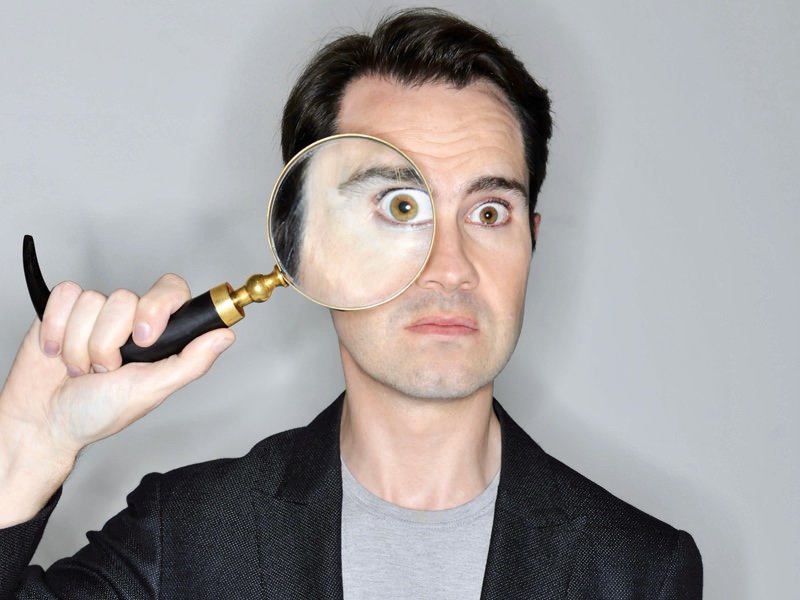
Jimmy Carr is on his way around Australia on his Funny Business tour, reminding audiences that by and large his humour is not suitable for broadcast.
“People generally know what they’re going to get when they come to my show these days,” he tells The Citizen. “Occasionally, people who know me from QI will come and see me live and be surprised that it is so different, and it’s a very rude show. It’s very bawdy and brutal and edgy, but that’s very much my sense of humour. Even when I’m on those shows like 8 Out of 10 Cats or QI or whatever, I always try to tell jokes that I find funny, which is all you can really do as a performer.”
Carr is known for a fearsome work ethic that sees him perform around 300 shows a year, a livelihood that has taken him through almost every comedy venue in the British Isles. As a result, Carr is used to anything audiences might throw at him, and his treatment of hecklers is a force of legend.
“I never think people are genuinely offended – well, rarely they’ll be genuinely offended – because they’re so clearly jokes. There’s a throughline, a punchline. It’s not like it’s a point of view, it’s not like I genuinely believe something.”
“Audiences are remarkably standardised,” Carr explains. “Once you get over about 50 people, they laugh at the same things in the same way.
“It’s no different where you’re performing. Nights of the week have slightly different characters. I’ve just done a gig on a Tuesday night and it’s a lovely atmosphere. You might play a show on a Saturday and people have been drinking since 12. Saturday it’s more couples. Friday people have been drinking since they finished work at 5 and they’re hammered by 8, which is more of a challenge.”
In the decade or so that Carr has been performing, much has changed both politically and socially and he has been perfectly placed as an edgy ‘politically incorrect’ comic to gauge such shifts. As he’s been plying his wares, his profile has risen too, but that’s not something that gives him any greater scope for subjects.
“If anything, I feel it’s the other way around,” he reflects. “I feel if you’re in the public eye, the jokes that draw attention tend to be the ones with a vested interest.
“Complaining about jokes is a great way to get publicity for a cause, so if there’s something that’s very sensitive in society, talking about that joke can be a great way to recruit people to your cause in the papers.
“I never think people are genuinely offended – well, rarely they’ll be genuinely offended – because they’re so clearly jokes. There’s a throughline, a punchline. It’s not like it’s a point of view, it’s not like I genuinely believe something.”
Carr has also noticed the homogenisation of media, which has proven a boon for more topical material.
“If you’re joking about Oscar Pistorious, there was a time, maybe 20 years ago, where that would have been a big story in South Africa and nowhere else. But now it’s a global thing and everybody’s gossiping, so if you mention the cultural references, the touchstones, whether it’s the Kardashians or Kanye, you can reference those people wherever you go.”

In choosing subjects suitable for satire or ridicule, many comedians have a “don’t punch down” rule. For example, domestic violence and rape victims and ethnic minorities are typically off-limits to most comedians, but Carr sees this as anathema to his trade.
“I don’t think it makes any sense at all to say, ‘I can make a joke about this thing but not that thing’,” he says, getting riled up. “I think that’s an incredibly patronising concept, to say that I can joke about these things because they can take it, but I’m not going to joke about these other things because they wouldn’t be able to take it’. That’s an awful example, isn’t it? The audience are intelligent. They get what’s a joke and what isn’t.”
This approach has seen Carr draw polarised reviews for his shows. Some cite his proudly middle-class British roots as an indefensible sign of privilege that allows him to take shots at less socially-mobile subjects.
“I’m not a very politically correct comedian,” Carr admits. “But I’m very aware of how important political correctness is in our society. I don’t think being offended is the worst thing that’s happened to anyone. It’s a fancy way of ‘I was upset. I was sad. I didn’t like that’. Well, OK. Fine. There’ll be another joke along in a minute, and also I’m not broadcasting.
“On TV, you’re ultimately a guest in someone’s home and different rules apply. There’s no regulation for live comedy and hopefully there never will be because where do you draw the line? Someone has lost a family member crossing a road walking after a chicken I feel sure. So you’d not be able to tell a joke about anything.”
Ultimately, he says, the audience decide what’s funny and what’s acceptable. Carr’s style of rapid-fire one liners means that he’s often working through 300 to 500 jokes per show, adding, editing and refining them every day. A joke like “I’ve never had erectile dysfunction – touch wood”, is unlikely to offend, and causing offence, he says, is pointless if the audience doesn’t laugh.
“Comedy is about the release of tension, and laughter is a social expression of tension being released,” Carr adds. “When there are terrible things happening in the world I think it’s all the more necessary to come out and have a laugh and enjoy yourself. Something like Charlie Hebdo, I can relate to them strongly because they do what I do. They tell irreverent jokes and they paid a hefty price for that.
“But with the best will in the world, I’ve got no point to make, I’ve got no axe to grind. I’m an entertainer and I’m just trying to make people laugh. I’ll reference Charlie Hebdo because there’s a lot of tension around it and it’s great to feel that prickle of the audience before you burst it with a laugh.”
Jimmy Carr’s Funny Business Australian Tour
Jan 22 — State Theatre, Sydney
Jan 24 — Civic Centre, Newcastle
Jan 25-27 — Hamer Hall, Melbourne
Jan 30 — Thebarton Theatre, Torrensville
Jan 29 — Performing Arts Centre, Geelong
Feb 3 — Perth Convention and Exhibition Centre, Perth


